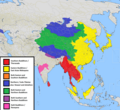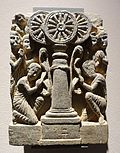Mahāyāna (/ˌmɑːhəˈjɑːnə/ MAH-hə-YAH-nə; Sanskrit: महायान, pronounced [mɐɦaːˈjaːnɐ], lit. 'Great Vehicle') is a term for a broad group of Buddhist traditions...
150 KB (17,762 words) - 22:29, 9 December 2024
The Mahāyāna sūtras are a broad genre of Buddhist scripture (sūtra) that are accepted as canonical and as buddhavacana ("Buddha word") in certain communities...
113 KB (13,271 words) - 19:56, 8 December 2024
Bodhisattva (section Mahāyāna)
confirmation or prediction from a living Buddha that this will be so. In Mahāyāna Buddhism, a bodhisattva refers to anyone who has generated bodhicitta,...
108 KB (12,475 words) - 14:43, 21 December 2024
Look up Mahayana in Wiktionary, the free dictionary. Mahayana canon is the canon of scriptures of Mahayana Buddhism. Mahayana canon may specifically refer...
1 KB (191 words) - 18:17, 11 April 2024
Buddhism (section Other key Mahāyāna views)
India indicate that both Mahāyāna and non-Mahāyāna monks could be found in the same monasteries, with the difference that Mahāyāna monks worshipped figures...
252 KB (28,035 words) - 16:40, 17 December 2024
Schools of Buddhism (section Mahāyāna schools)
Teaching'), and Mahāyāna (lit. 'the Great Vehicle'). The most common classification among scholars is threefold: Theravāda, Mahāyāna and Vajrayāna. In...
42 KB (4,307 words) - 09:53, 25 December 2024
Buddhahood (section Buddhahood in Mahāyāna Buddhism)
all pervasive. This view can be found in numerous Mahāyāna sources, like the Avatamsaka sutra. Mahāyāna buddhology mainly understands the Buddha through...
82 KB (8,633 words) - 06:23, 24 December 2024
rebirth as well as the dissolution of the skandhas. In some Mahāyāna scriptures, notably the Mahāyāna Mahāparinirvāṇa Sūtra, parinirvāṇa is described as the...
15 KB (1,649 words) - 13:16, 24 December 2024
Buddhist texts (section Mahāyāna texts)
virtuous to non-Mahāyāna sutras. The Mahāyāna sūtras are traditionally considered by Mahāyāna Buddhists to be the word of the Buddha. Mahāyāna Buddhists explained...
66 KB (7,686 words) - 19:06, 5 November 2024
vehicle (yana) of the Buddha's teachings. It is often contrasted with Mahāyāna, the second vehicle of the Buddha's teachings, or the great (maha) vehicle...
20 KB (2,410 words) - 07:11, 13 December 2024
Arhat (section In Mahāyāna Buddhism)
regarded arhats as imperfect in their attainments compared to buddhas. Mahayana Buddhist teachings urge followers to take up the path of a bodhisattva...
28 KB (3,348 words) - 03:45, 1 November 2024
from Chinese: Chán; in Korean: Sŏn, and Vietnamese: Thiền) is a school of Mahayana Buddhism that originated in China during the Tang dynasty as the Chan School...
199 KB (23,246 words) - 08:16, 21 December 2024
Awakening of Faith in the Mahāyāna (AF, Chinese: 大乘起信論; pinyin: Dàshéng Qǐxìn Lùn; Japanese: 大乗起信論, Daijōkishinron; Korean: 대승기신론, Daeseung-gisinron; Vietnamese:...
27 KB (3,205 words) - 15:27, 11 December 2024
sometimes used to describe the three main schools of Buddhism (Theravāda, Mahāyāna, and Vajrayāna) as it spread from the northeastern region of the Indian...
12 KB (1,260 words) - 02:43, 7 September 2024
In Mahayana Buddhism, bodhicitta ("enlightenment-mind" or "the thought of awakening") is the mind (citta) that is aimed at awakening (bodhi) through wisdom...
28 KB (3,121 words) - 18:41, 24 December 2024
Pāramitā (section Mahāyāna Buddhism)
terms in Pali but Pali literature makes greater reference to pāramī, while Mahayana texts generally use the Sanskrit pāramitā. Donald S. Lopez Jr. describes...
23 KB (2,491 words) - 19:45, 21 December 2024
Refuge in Buddhism (section In Mahayana Buddhism)
Buddhism. Since the period of Early Buddhism, all Theravada and mainstream Mahayana schools only take refuge in the Triple Gem. However, the Vajrayana school...
24 KB (2,483 words) - 14:01, 11 November 2024
Pure Land Buddhism (section Key Mahayana sources)
Pure Land School (Chinese: 淨土宗; pinyin: Jìngtǔzōng) is a broad branch of Mahayana Buddhism focused on achieving rebirth in a Pure Land. It is one of the...
167 KB (22,917 words) - 16:46, 17 December 2024
Mahayana Temple (Chinese: 大乘寺; pinyin: Dàchèng Sì; Jyutping: Da4sing4 Zi6) is a Chinese Buddhist temple organization headquartered within a forest in South...
2 KB (165 words) - 13:51, 18 September 2024
Buddhist vegetarianism (section Mahayana view)
vegetarianism is the practice of vegetarianism by significant portions of Mahayana Buddhist monastics and laypersons as well as some Buddhists of other sects...
40 KB (4,932 words) - 21:44, 17 December 2024
Prajñā (Buddhism) (section Mahāyāna Buddhism)
("dissatisfaction" or "suffering"), and anattā ("non-self" or "egolessness"). Mahāyāna texts describe it as the understanding of śūnyatā ("emptiness"). It is...
19 KB (1,712 words) - 08:39, 19 August 2024
maintained Bodhisattva Piṭakas, which contained texts that were later termed "Mahayana". Each of the early Buddhist Schools likely had their own versions of the...
45 KB (4,759 words) - 07:50, 7 December 2024
Chinese Buddhism (redirect from Chinese Mahayana)
Cyun4 Fat6 Gaau3; Pe̍h-ōe-jī: Hàn-thoân Hu̍t-kàu) is a Chinese form of Mahayana Buddhism which draws on the Chinese Buddhist canon that includes the indigenous...
74 KB (7,983 words) - 23:11, 20 December 2024
Nirvana (Buddhism) (section In Mahayana Buddhism)
anupadhishesa-nirvana, meaning "nirvana without remainder" or final nirvana. In Mahayana these are called "abiding" and "non-abiding nirvana." Nirvana, as the quenching...
147 KB (18,098 words) - 23:00, 24 December 2024
Tathātā (section Mahayana Buddhism)
the subject–object distinction. Although it is a significant concept in Mahayana Buddhism, it is also used in the Theravada tradition. The Buddha referred...
6 KB (676 words) - 08:03, 12 December 2024
Manjushri (section In Mahāyāna Buddhism)
bodhisattva who represents prajñā (transcendent wisdom) of the Buddhas in Mahāyāna Buddhism. The name "Mañjuśrī" is a combination of Sanskrit word "mañju"...
24 KB (2,471 words) - 18:59, 13 November 2024
Buddhist meditation (section Indian Mahāyāna Buddhism)
seen as separate techniques, while Mahayana Buddhism generally stresses the union of samatha and vipassana. Both Mahayana and Theravada traditions share some...
111 KB (14,052 words) - 21:12, 15 December 2024
History of Buddhism (section Mahāyāna Buddhism)
movements, schisms, and philosophical schools. Among them were the Theravāda, Mahāyāna and Vajrayāna traditions, with contrasting periods of expansion and retreat...
103 KB (11,998 words) - 16:41, 23 December 2024
Hinduism during the first millennium CE, significantly influenced South Asian Mahāyāna Buddhism, giving rise to distinct Buddhist tantric traditions. Emerging...
99 KB (11,911 words) - 13:29, 18 December 2024
discourses, i.e., the Mahayana sutras. Buddhism evolved into a variety of traditions and practices, represented by Theravada, Mahayana and Vajrayana, and...
232 KB (26,456 words) - 21:35, 24 December 2024






















